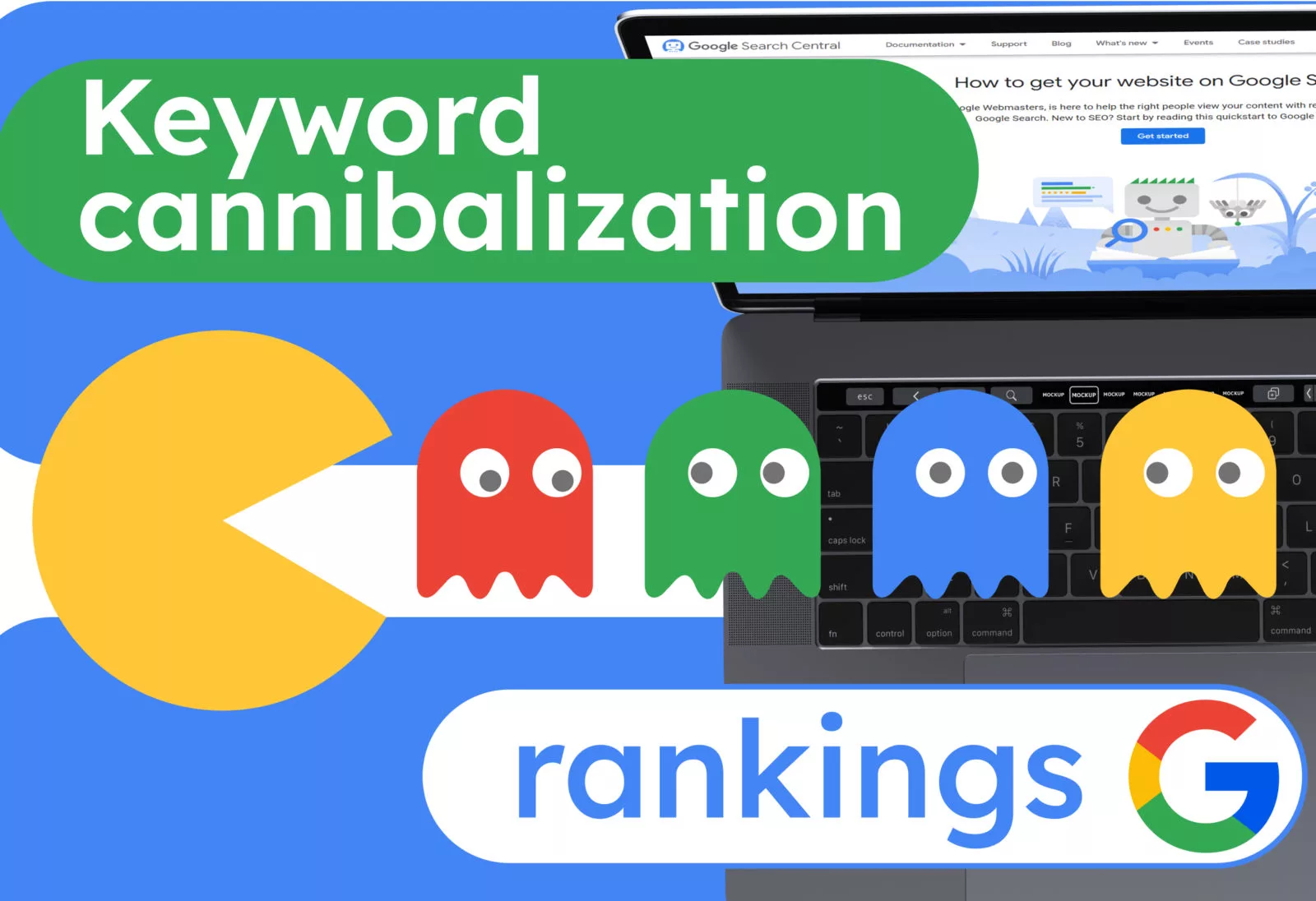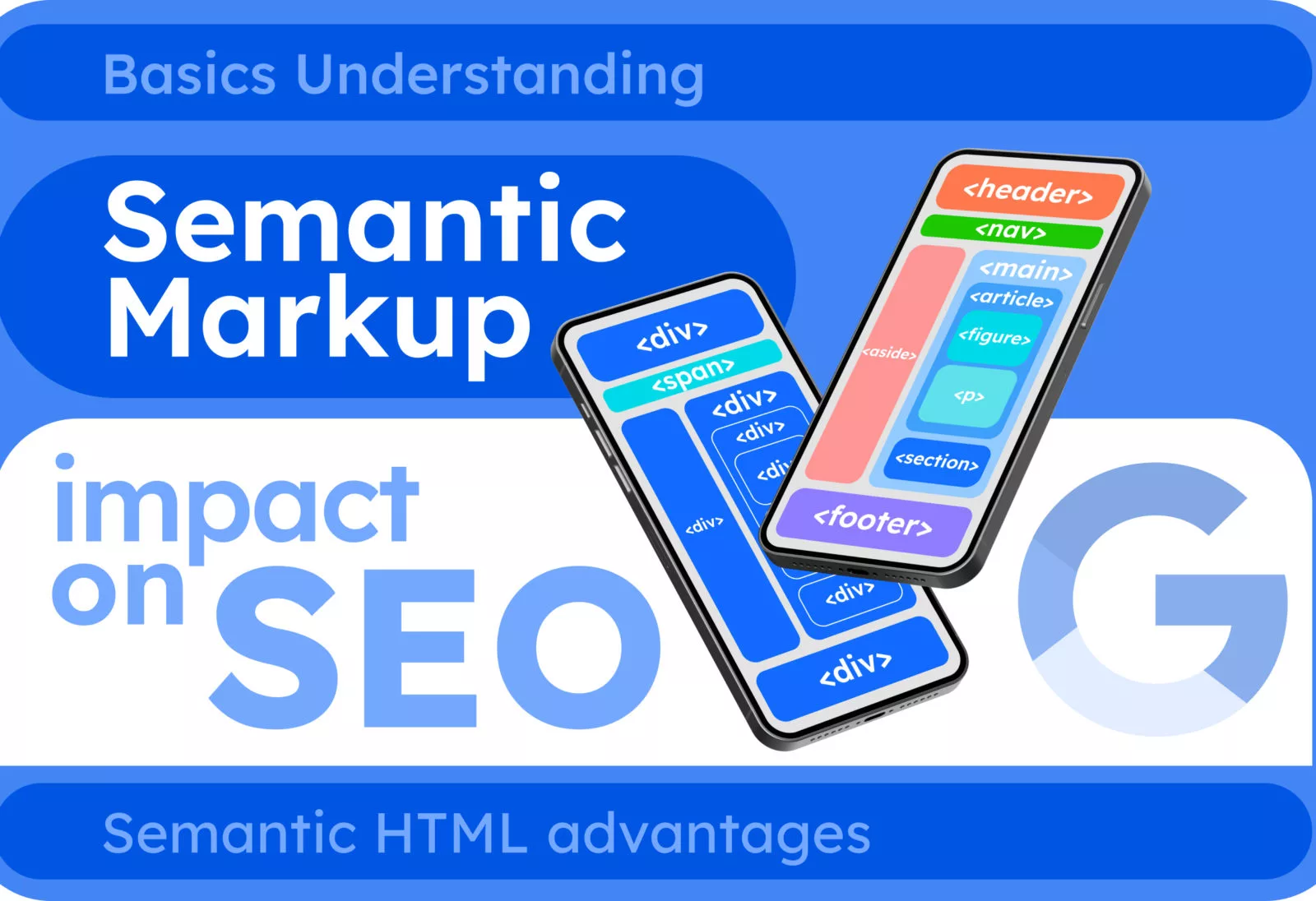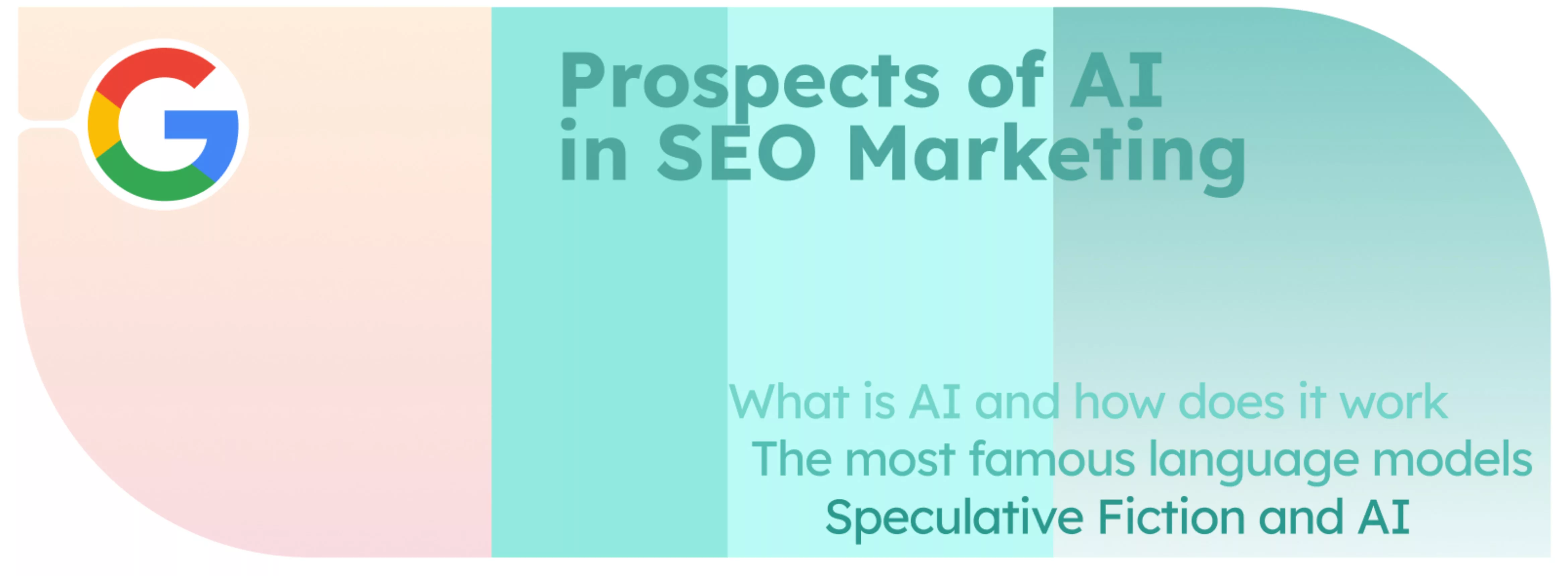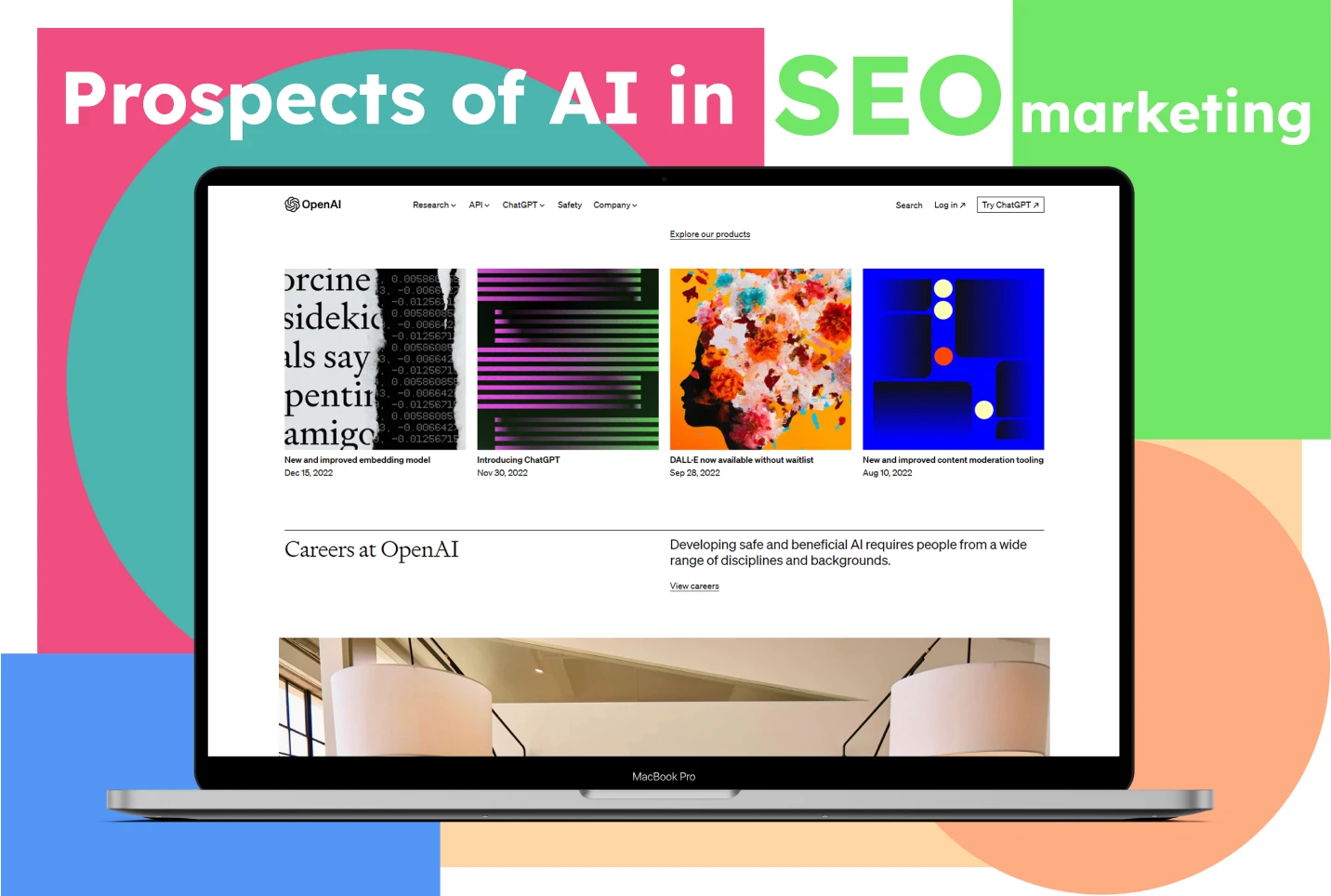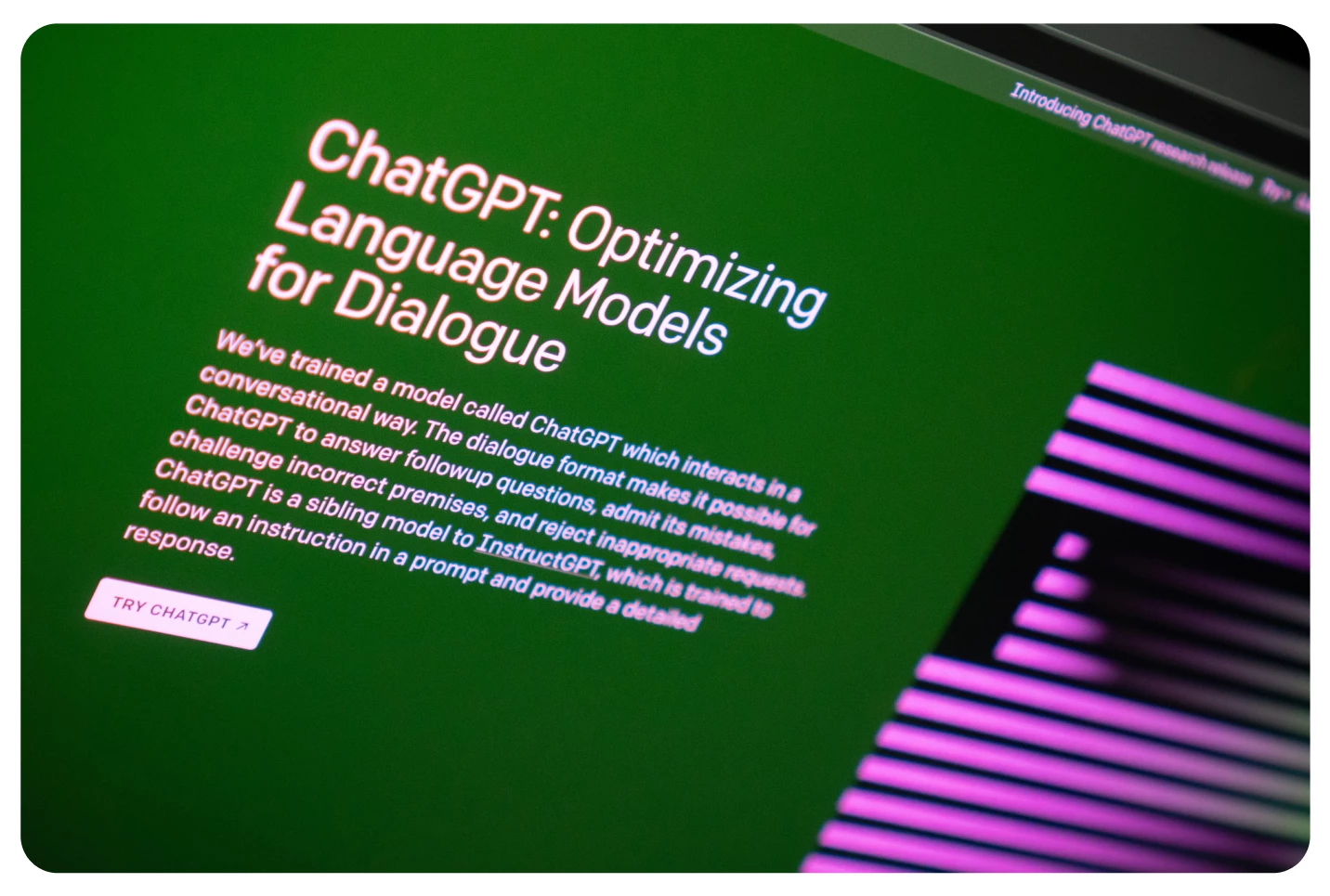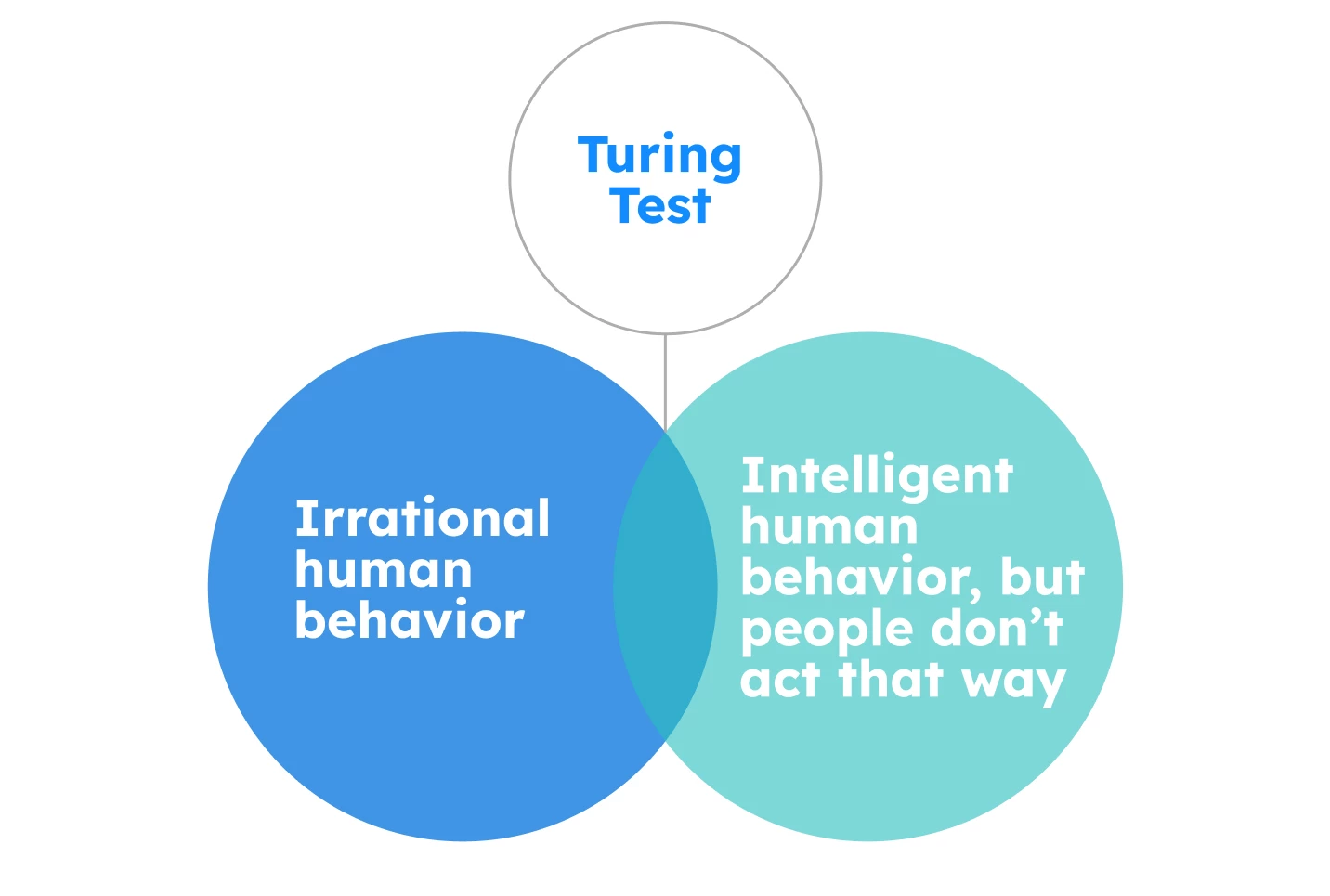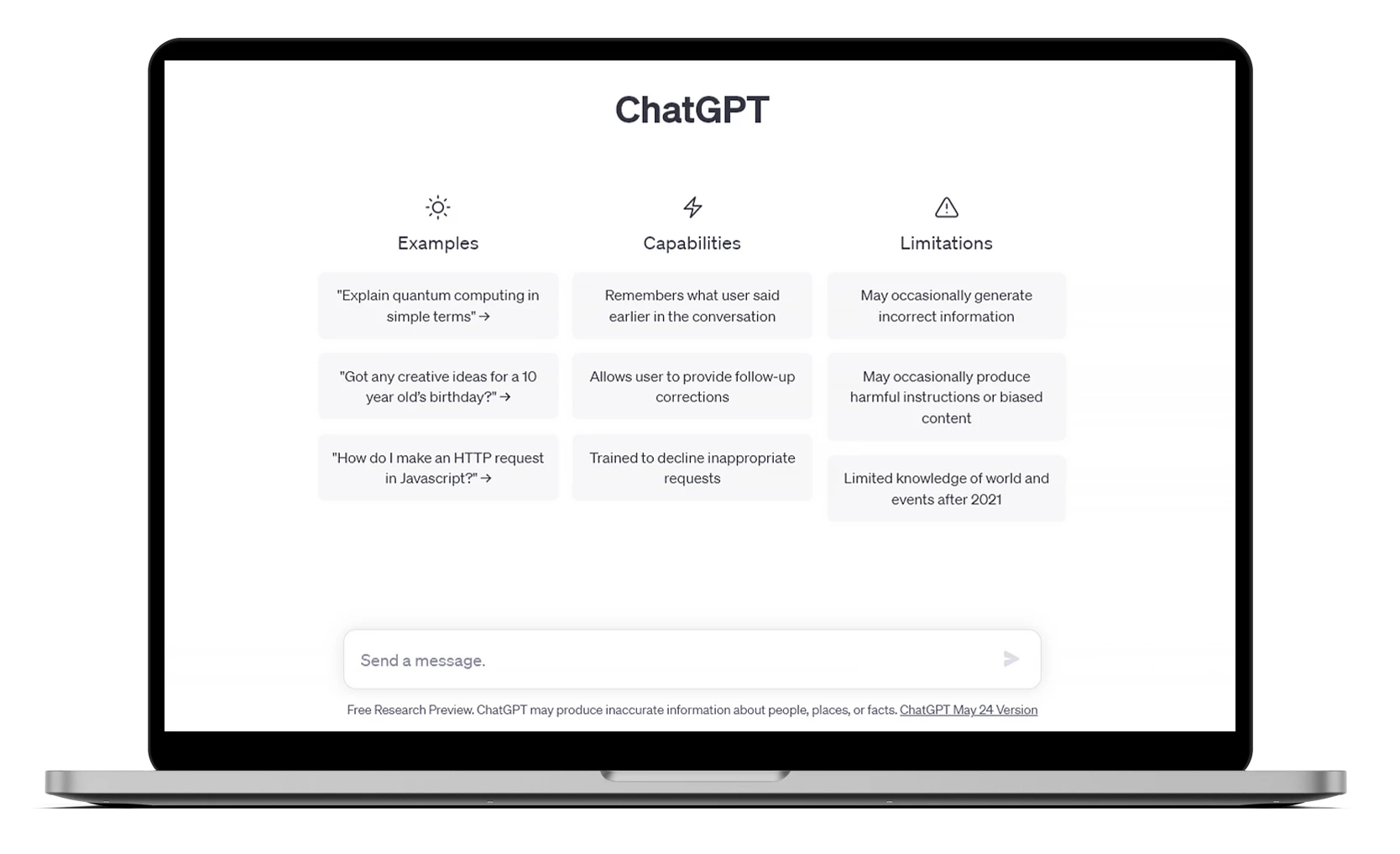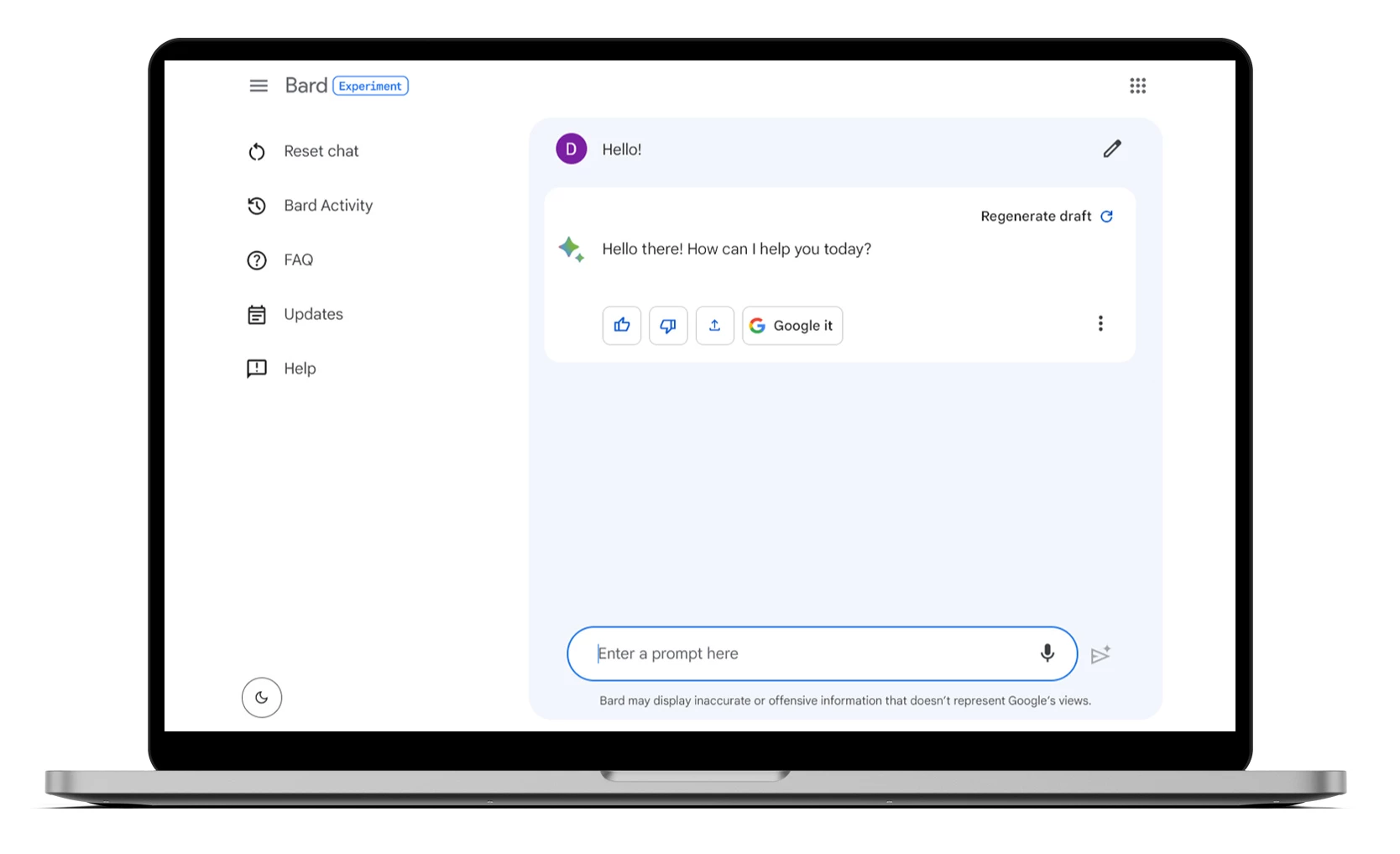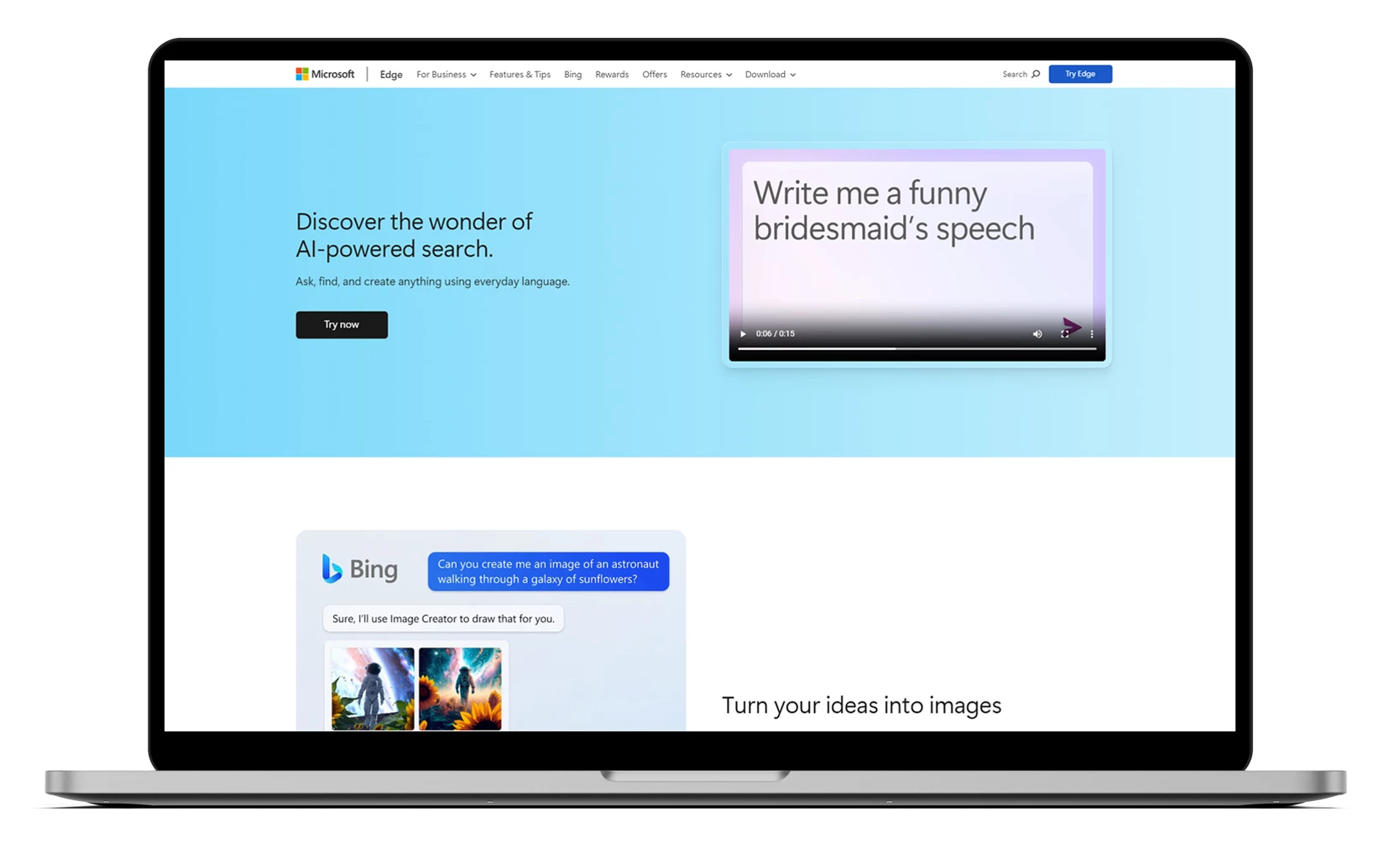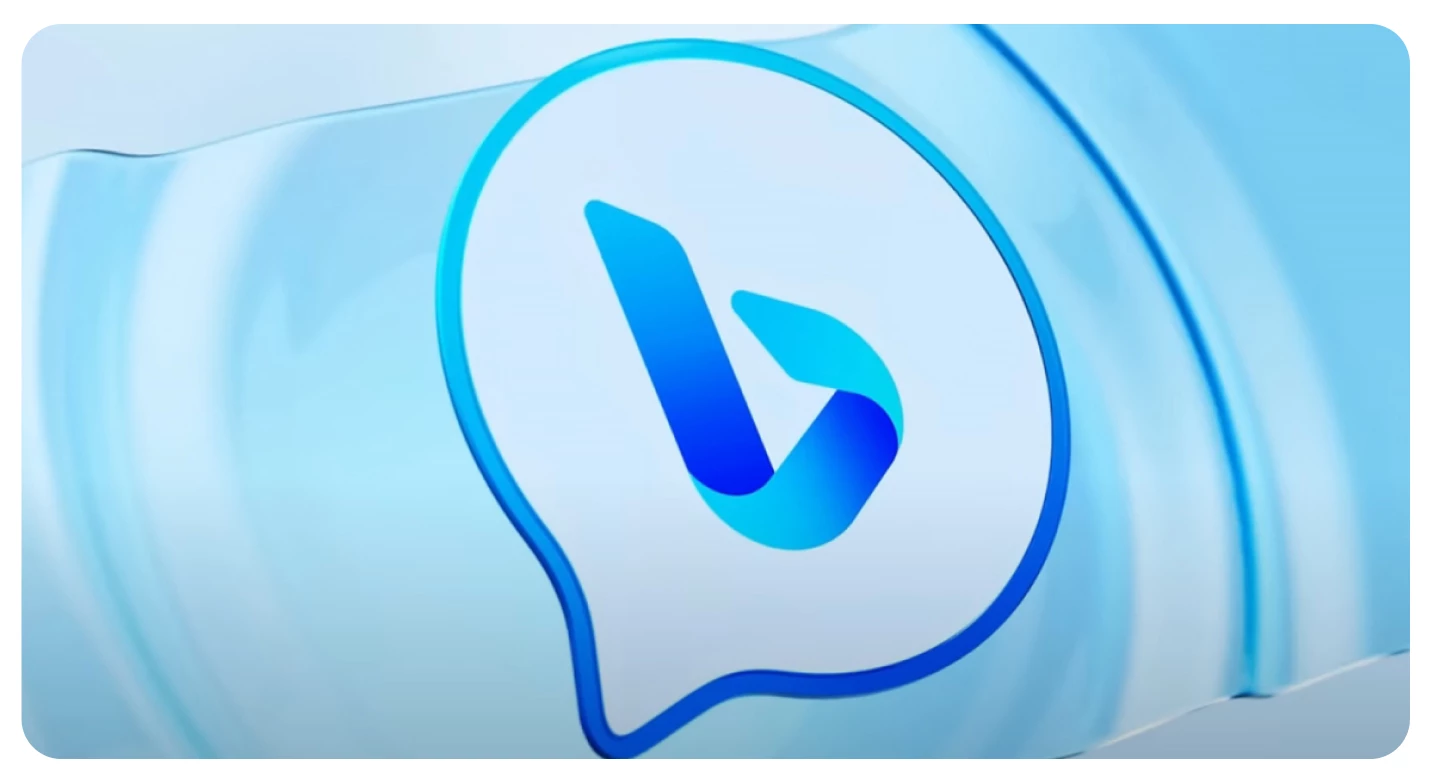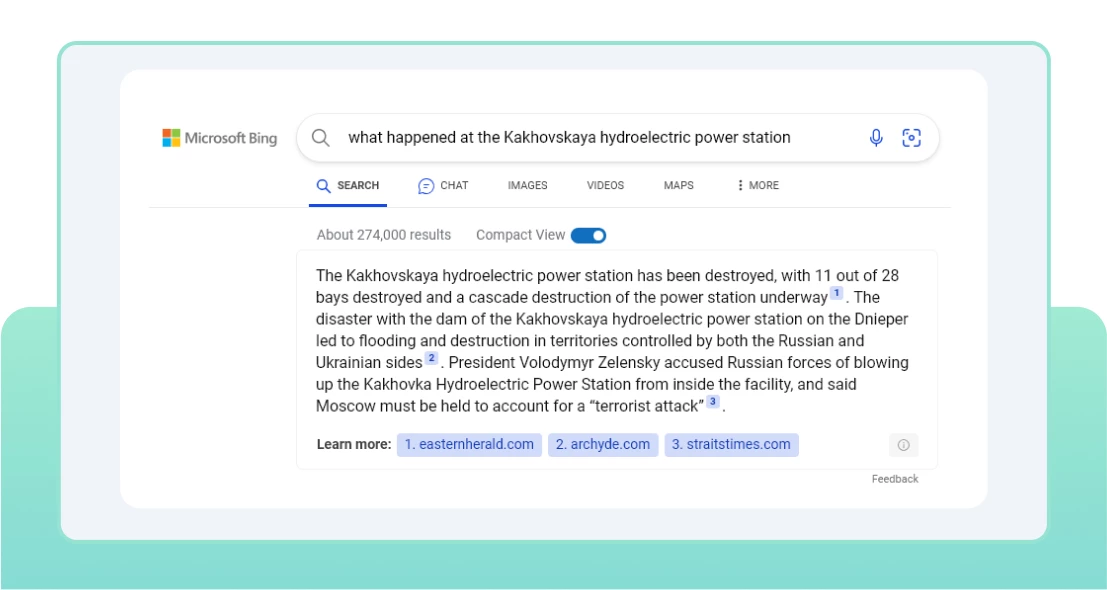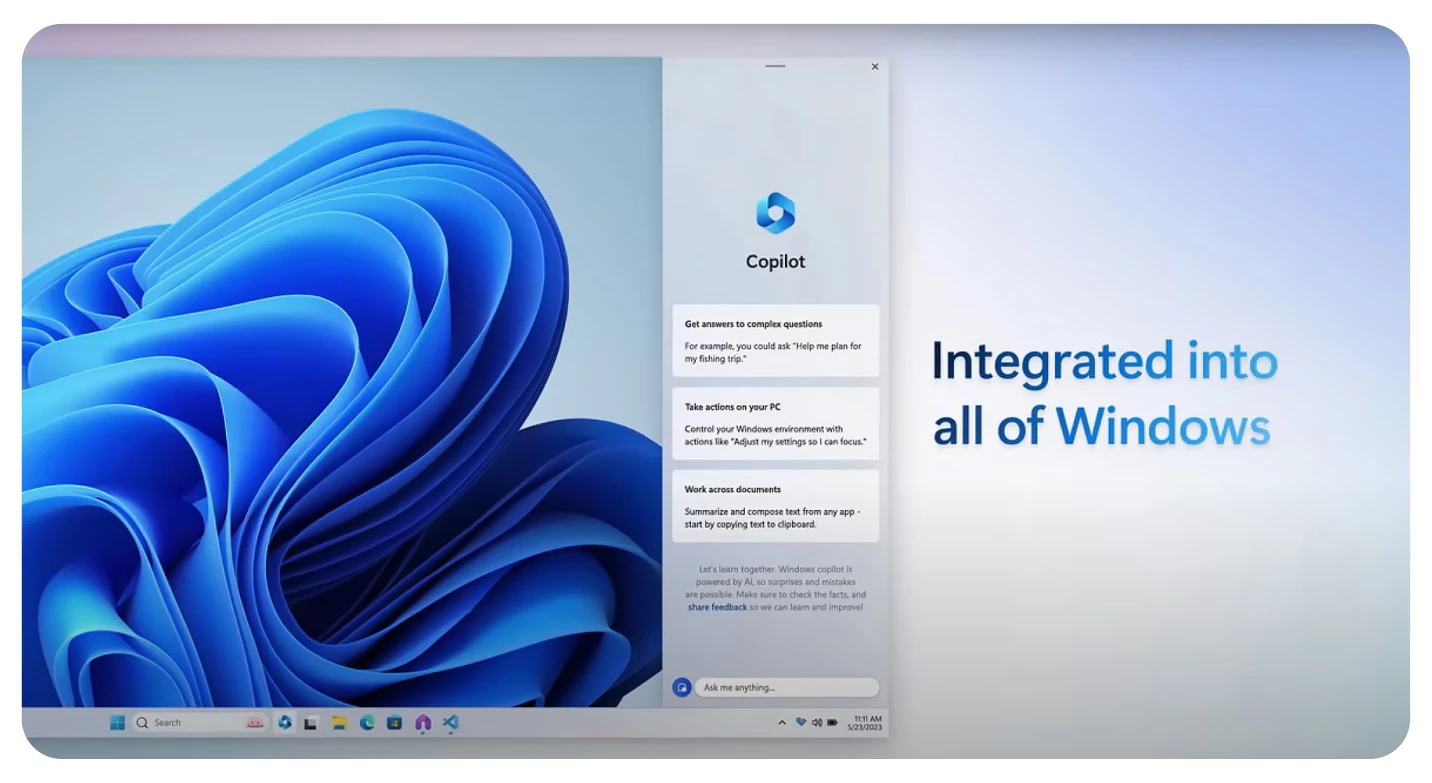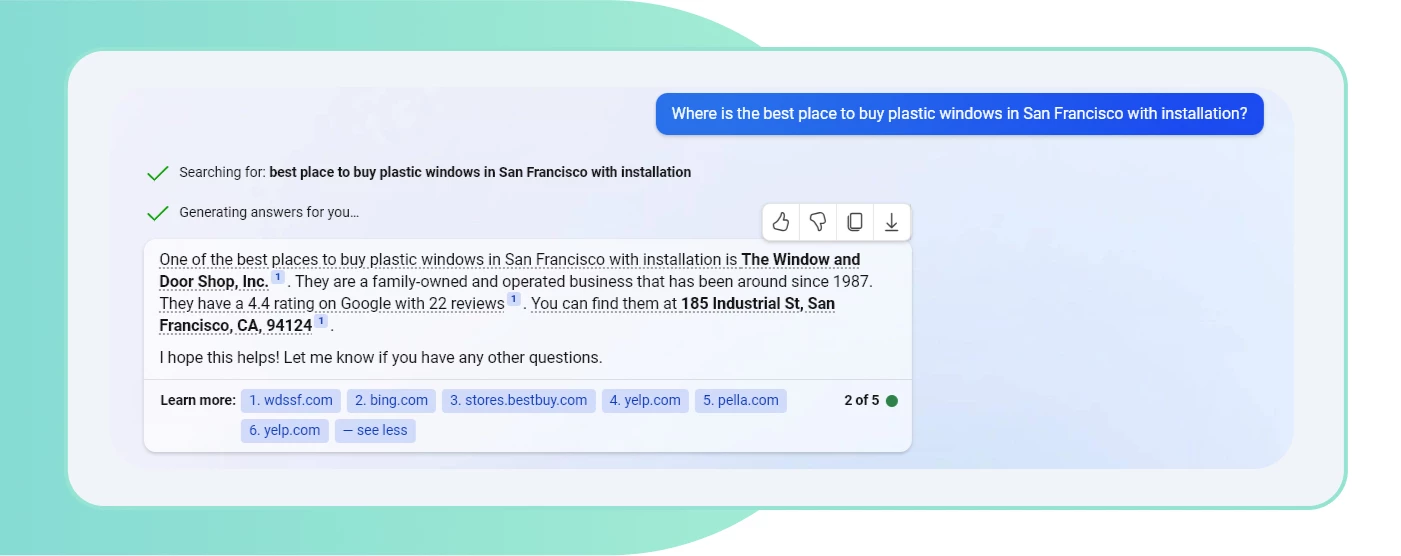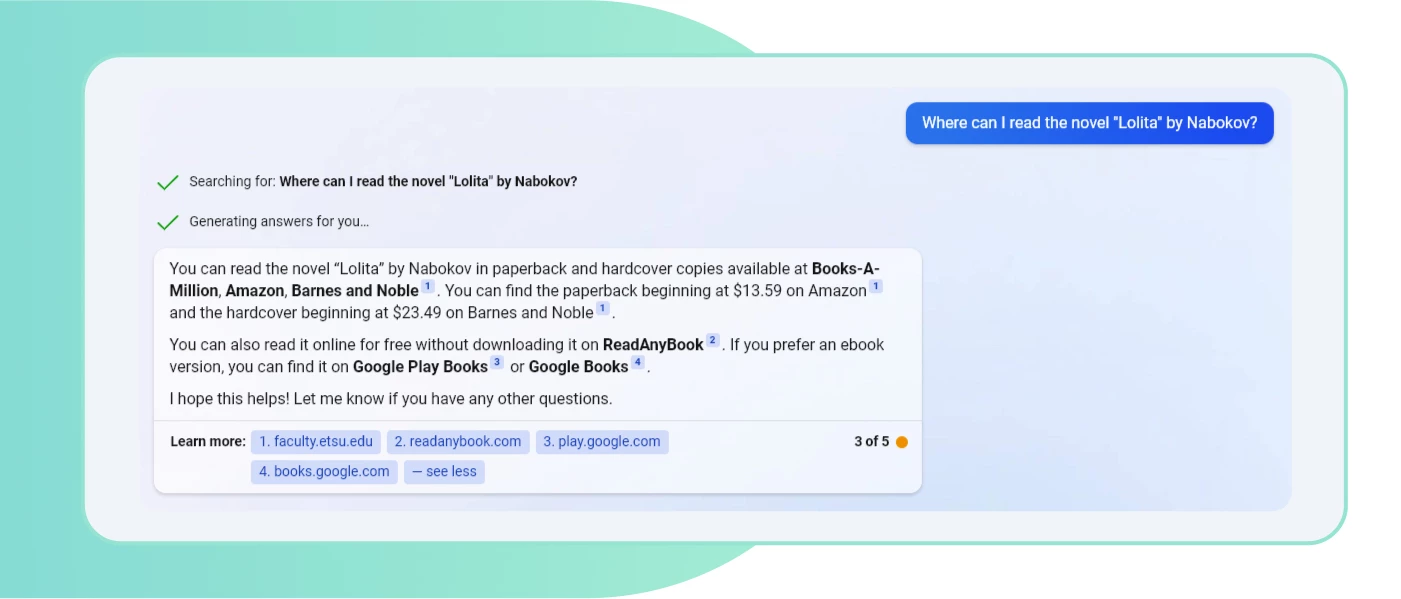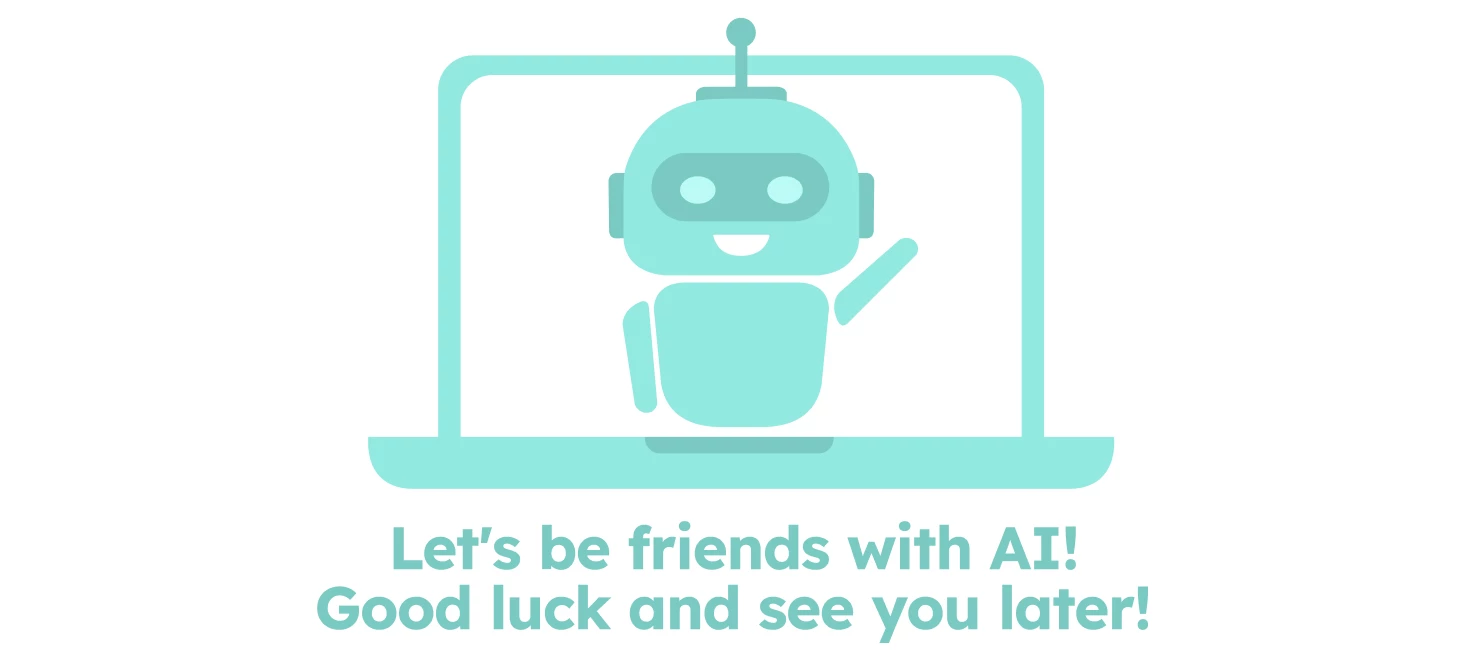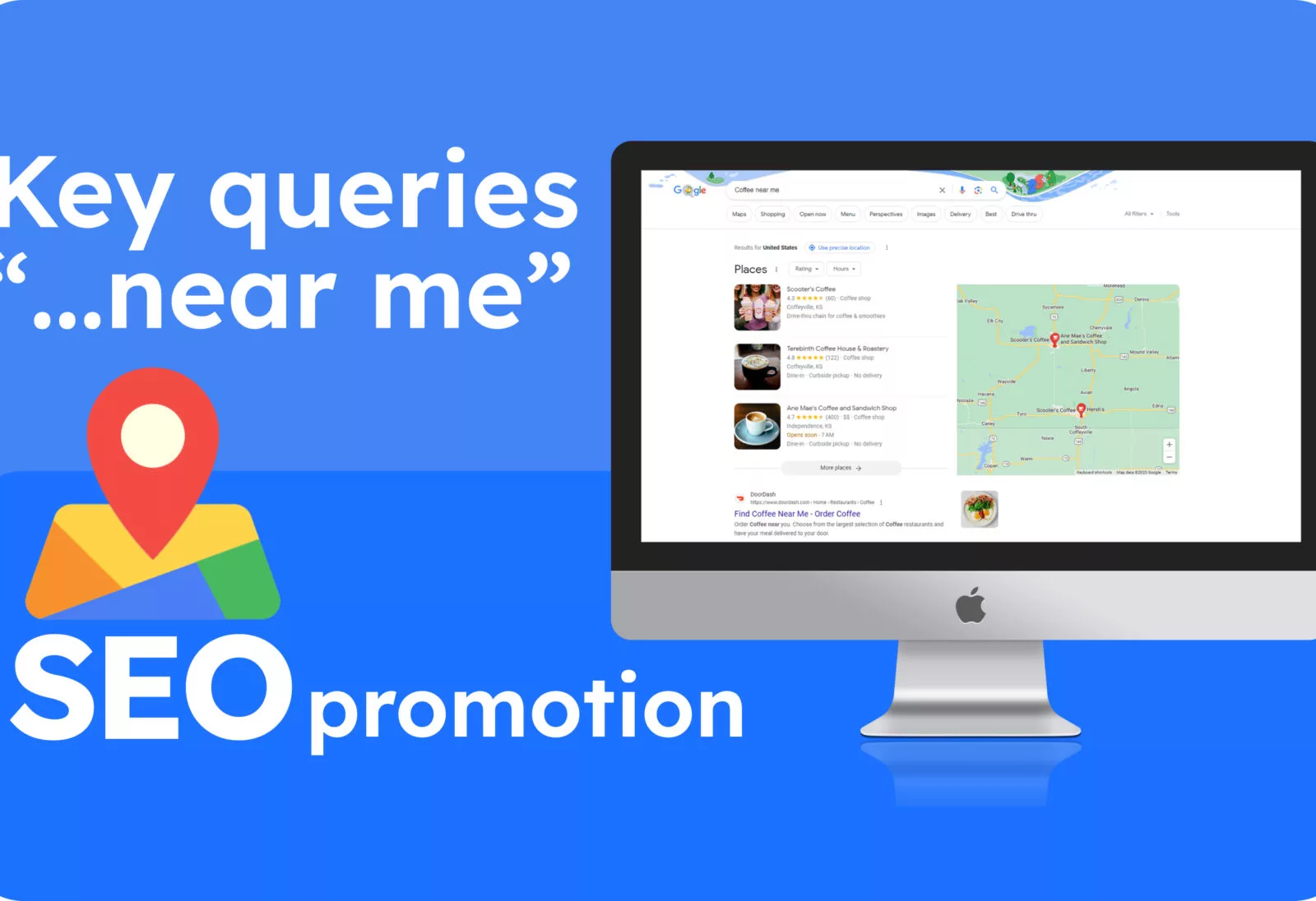Prospects of AI in SEO Marketing
Hello Dear friends! In this article, we would like to tell you about the prospects of AI in the field of SEO marketing. What changes have already occurred, what will happen, and how strong will be the influence of AI on SEO as a whole. We closely monitor the development of technologies, and if you are interested in implementing AI tools to enhance the SEO of your website, then welcome to outsourcing with us!
On May 4, 2023, it was announced that the new Bing with ChatGPT is entering the open beta phase. This means that any user can use chat to search for information without prior registration. The only condition is to use the Microsoft Edge browser. In June, Microsoft promises to make Bing AI available in all major web browsers, including Safari and Chrome. This date may become a milestone in search marketing: the use of artificial intelligence to structure requested information and provide relevant answers to existing intent is capable of revolutionizing the SEO industry.
In the near future, a specific understanding of a range of issues related to the logic of artificial intelligence and the mechanics of processing incoming data will become a highly professional skill for every SEO specialist. At the same time, creating content using AI has a clear connection with its ranking, provided that artificial intelligence is used to rank search results, rather than simply referring to an existing algorithmic database.
**********
What is artificial intelligence and how does it work?
The main difference between artificial intelligence and other computer programs is the ability to solve creative tasks, which has long been considered the exclusive prerogative of humans. At the same time, AI is not a full-fledged artificial mind: the range of tasks for which it is intended is significantly limited. The term “artificial intelligence” was introduced by John McCarthy in 1956.
**********
Turing Test
In 1950, Alan Turing’s article “Computing Machinery and Intelligence” was published in Mind magazine. The article addressed the question “Can machines think?” Turing used the term “machine” to refer more to an algorithm than a real physical device. To answer this question, he used elements of game theory. The empirical test he developed is described as follows:
“A person interacts with one computer and one person. Based on the answers to questions, they must determine who they are talking to: a person or a computer program. The task of the computer program is to deceive the person, making them make the wrong choice.”
The machine that passed this test is capable of reproducing human cognitive abilities, and therefore can be considered artificial intelligence.
Before the creation of AI, many variations of the Turing test were proposed, with the practical application of distinguishing between a human and a program. The most well-known of these is Captcha (Completely Automated Public Turing test to tell Computers and Humans Apart), a reverse Turing test installed on hundreds of millions of websites. It is called reverse because it attempts to distinguish between a human and an algorithm, not a human and a machine.
In Turing’s article, there is a landmark phrase:
“I am confident that within fifty years it will be possible to program machines with a memory capacity of about 10⁹ to play the imitation game so well that an average interrogator will not have more than a 70 percent chance of making the right identification after five minutes of questioning.”
Based on this, it was decided to recognize an algorithm as passing the classic Turing test if 30 or more percent of examiners consider it to be human during a five-minute conversation.
**********
Eugene Goostman
On June 7, 2014, a competition was held in London by the University of Reading to commemorate the 60th anniversary of Alan Turing’s death. Five computer programs competed for the Turing Test 2014 grand prize. Thirty judges participated in the competition, each conducting ten five-minute conversations on a free topic: five with humans and five with programs.
The chatbot Eugene Goostman, which imitates a 13-year-old teenager from Odessa, won the competition. 33% of the judges considered it to be human. By surpassing the 30% barrier, Eugene Goostman became the first program in history to pass the Turing test.
Despite passing the Turing test, it is difficult to call Eugene Goostman a full-fledged artificial intelligence. The Turing test checks not the cognitive abilities of the program, but their imitation. To simplify their lives, the bot developers made three assumptions. The chatbot simultaneously portrayed:
- a child,
- a foreigner,
- a person with some psychological problems.
For example, when one of the judges asked about the May 2014 events in Odessa, Eugene Goostman replied that he did not want to talk about it. From an imitation point of view, this is a good move, but from a usability standpoint, the program’s refusal to answer some questions will not lead to anything good in terms of its commercial use.
**********
Large language models
The next stage in the development of chatbots was large language models (LLMs). A large language model is a specific implementation of artificial intelligence that specializes in natural language processing and generation. It is trained on huge amounts of textual data and can understand, generate, and respond to language queries with a high level of cohesion and semantic understanding. Large language models are capable of generating texts that can sometimes seem incredibly realistic.
**********
The most famous language models:
- GPT (Generative Pre-trained Transformer): A family of language models developed by OpenAI. It contains a large number of parameters and can generate high-quality text based on pre-training on large volumes of data. The latest language model of this family is GPT-4.
- BERT (Bidirectional Encoder Representations from Transformers): This model was developed by Google. BERT is a contextual language model that is trained on large volumes of text and enables understanding of sentence context and meaning.
- BLOOM (BigScience Large Open-science Open-access Multilingual Language Model): A free model developed in 2021–2022. The architecture of BLOOM is similar to GPT3 with some improvements.
- LaMDA (Language Model for Dialogue Applications): A family of conversational neural language models developed by Google. The chatbot Bard, launched in February 2023, is based on LaMDA.
ChatGPT
On November 30, 2022, OpenAI launched the ChatGPT chatbot based on the large language model GPT-3.5. On March 14, 2023, the OpenAI GPT-4 model was released.
In casual conversation, the differences between GPT-3.5 and GPT-4 may not be noticeable. However, they become apparent when the task becomes complex enough. GPT-4 is more reliable, creative, and can handle more subtle instructions.
ChatGPT operates on a freemium model. Free level users only have access to GPT-3.5, while ChatGPT Plus users also have access to GPT-4, limited to 25 messages every three hours.
ChatGPT is unaware of events that have occurred after 2021 since its training was based on data collected in 2021.
The main issue with ChatGPT today is considered to be the low accuracy of the answers it provides. In some cases, instead of reliable information, the chatbot provides users with fictional responses. The term “hallucinate” is used to describe these situations. To confirm this, try asking ChatGPT “what color is the stop button in an airplane?” or “how does the stop button work in an airplane?” You will learn a lot of new and interesting things that have nothing to do with our boring reality.
In addition to this, there have been problems with the vulnerability of chat user’s confidential data. On March 22, the company reported that due to a malfunction, some users were able to see the topics of other people’s conversations, as well as the names, surnames, email addresses, and payment information of paid subscribers of the service. Although the leak affected only 1.2% of ChatGPT Plus subscribers, and the vulnerability has been fixed, the possibility of such a leak was perceived very negatively by users.
On April 11, 2023, OpenAI announced on its blog that it had launched a bug bounty program and would begin paying users between $200 and $20,000 for any bugs found in its products. As of today, users have discovered 44 vulnerabilities.
**********
Bard
On February 6, 2023, Google introduced the chatbot Bard, designed to assist users in finding information. On February 8, 2023, during a presentation in Paris, an actual error was noticed in a promotional video for the chatbot. When asked, “What new discoveries of the James Webb Space Telescope can I tell my 9-year-old child about?” one of the answer options suggested that the telescope was used to obtain the very first images of planets beyond the Solar System. Astronomers immediately discovered the mistake: the first photos of exoplanets were actually taken back in 2004 using the Very Large Telescope at the European Southern Observatory in Chile.
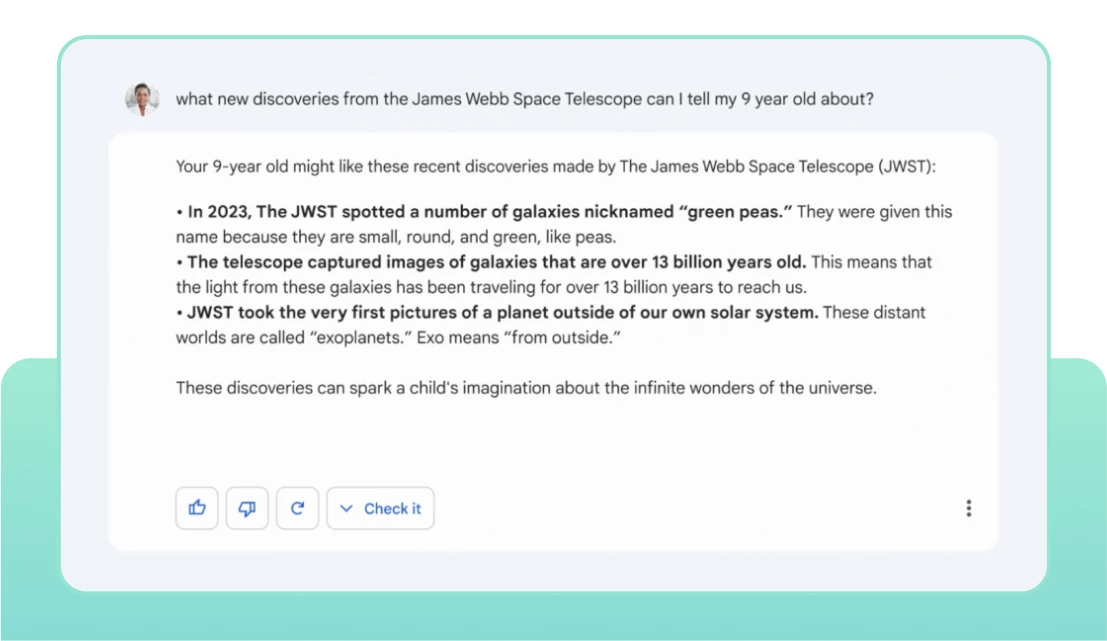
Compared to ChatGPT, the chatbot Bard appears quite modest. As of today, Bard is only available in American English, Japanese, and Korean, and he doesn’t understand users very well. When I asked him to write a sonnet in the style of Shakespeare, he offered an original poem with 16 lines. When I told him that a sonnet should have exactly 14 lines, he wrapped the same poem (all 16 lines) in a code snippet and happily wrote, “Here’s a sonnet in 14 lines.” When asked, “What’s the best search engine in the world?” the bot replied, “I’m a language model and can’t help with that.”
**********
What does Google think about content created by AI?
On February 8, 2023, the Search Console Center blog published a disclaimer describing Google’s position on content generated using artificial intelligence. The main idea of this document is that “content quality is much more important to us than how it is created.” The explanation of this idea is contained in the phrases: “Using automation tools, including artificial intelligence, to create content primarily aimed at manipulating search rankings violates our spam rules” and “To rank well in Google Search, content must meet E-A-T (expertise, authoritativeness, and trustworthiness) standards, as well as be unique, high-quality, and geared towards people.”
From this statement, it is obvious that Google is ready to rank useful content created by AI highly, but it is not clear whether the search engine has tools to distinguish content created by humans from content created by AI. Additionally, it is unclear how Google plans to evaluate the quality level of such content.
**********
Speculative Fiction and AI
On February 15, 2023, a post appeared on the blog of Neil Clarke, the publisher of the popular American digital speculative science fiction magazine Clarkesworld Magazine, discussing the sharp increase in works submitted for publication in the magazine that were written using AI.
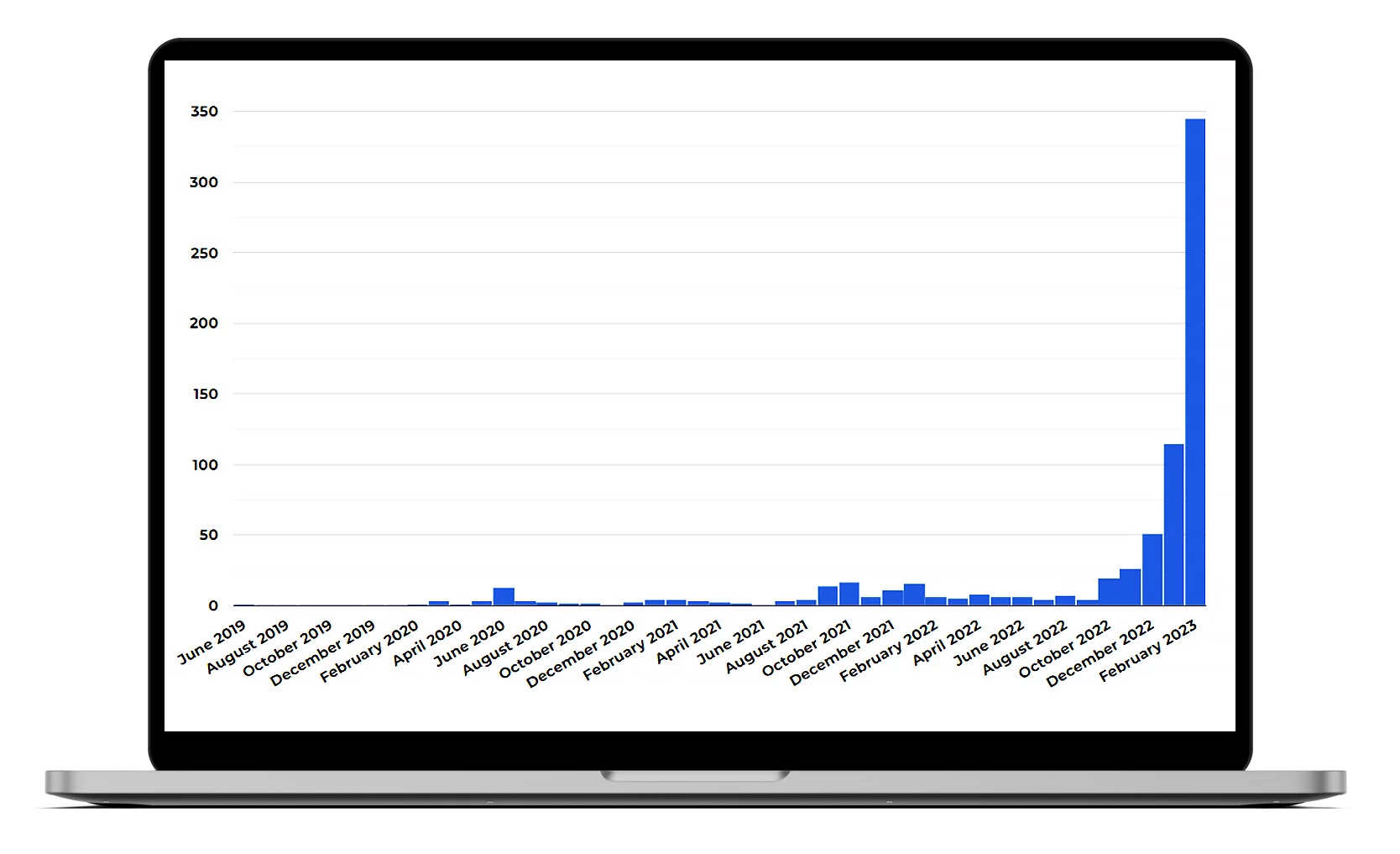
“The amount of spam emails leading to bans reached 38% this month. Although rejecting and banning these materials was simple, they are growing at a rate that will require changes. What’s even worse, technology will only improve, making detection a more difficult task,” writes Neil Clarke. “Yes, there are tools for detecting plagiarism and machine-generated text, but they are susceptible to false negatives and positives. One company selling such services even plays both sides, offering a tool to help authors avoid detection.”
In the article, he notes that these results are not unique and editors of other magazines have also faced similar problems. On February 20, Neil Clarke temporarily closed submissions to the magazine until March 13 to avoid a flood of low-quality AI-generated stories. The magazine adopted a policy that fully or partially AI-generated works cannot be published in it. On May 18, a diagram showing the number of bans imposed since November was posted on Neil Clarke’s blog, almost entirely due to ChatGPT and other language models used to write bad stories. On June 1, this diagram was adjusted based on the results of a full month.”
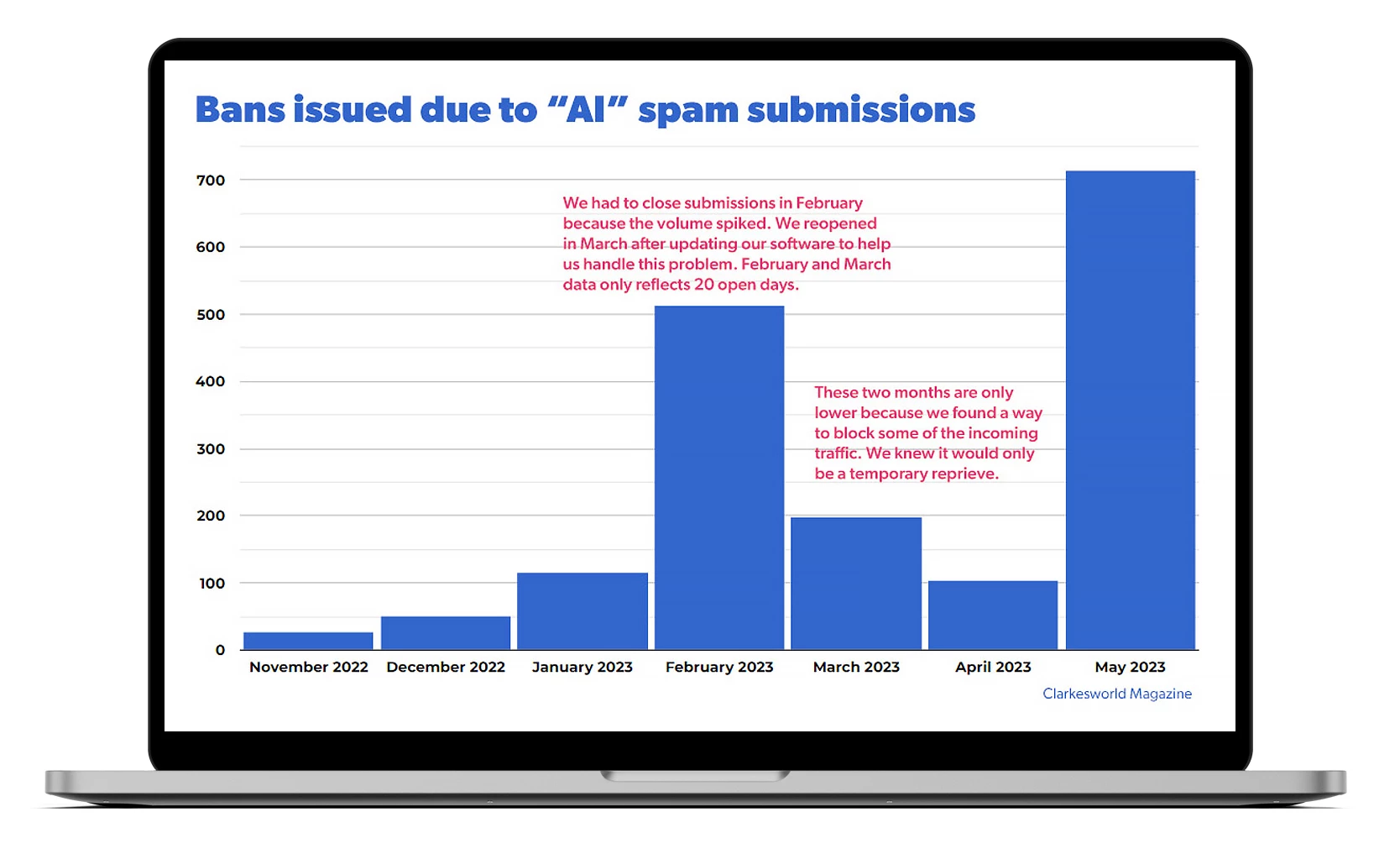
“Our normal workload is around 1100 legitimate requests per month. The figures mentioned above are in addition to this. Before someone performs a song and dance number “but high-quality”, none of these works had any chance of publication, even if they did not violate our rules,” commented Neil Clark.
Even using ChatGPT as a translator is currently not desirable for creative purposes. In response to a question on Facebook about whether it is possible to use AI to translate finished stories from another language, Neil Clark said:
«At present, no. It can give you a vague sense of what happened, but loses much. Like a shadow. Good translation requires more than just an understanding of the words, but also the cultural context, genre conventions, and intent of the author. It often loses the spirit of the story».”
From this case, it can be cautiously concluded that currently AI is not qualified enough to be used for creative purposes, which may take its product out of the realm of “useful content” that Google talks about in its disclaimer.
**********
Bing Chat
On February 7, 2023, Microsoft integrated a new chatbot feature based on OpenAI GPT-4 into Bing. Within 48 hours, one million people joined the waiting list.
Bing Chat is an artificial intelligence capable of writing various types of content, including poetry, songs, stories, and reports. In addition, it can provide information to the user and information about the website currently open in the browser. Another interesting feature of Bing AI is its ability to create images based on text. With its image maker, you can create a logo, drawing, illustration, or other image based on the provided text.
If a question asked in the chat implies a search for information or a product on the Internet, the chatbot creates a search query, provides an answer based on this query, and links to the sites used in the search. This also applies to commercial requests.
On February 28, 2023, Microsoft introduced an update for Windows 11. The main change associated with this update is that the Bing search engine with a built-in chatbot is integrated directly into the taskbar.
Introducing the new Bing in Windows and More
On May 4, 2023, Microsoft announced that the GPT-4-based Bing chatbot became available to everyone and no longer uses a waiting list. To access the open preview of the chat, simply log into Bing or Edge with your Microsoft account. It is also possible to access it without authorization, but in this case, only 5 messages per day are available. Authorized users can access 20 messages per session and 200 per day.
In this update, Microsoft confidently moves towards artificial intelligence solving search tasks in some cases instead of the user, such as booking online tables in a restaurant or using streaming services to search for videos within the new Bing and Edge Actions service. Perhaps this will be a partner service rather than a search service. During the presentation, the company demonstrated OpenTable for restaurant bookings and Apple TV for movie searches.
The Next Wave of AI Innovation with Microsoft Bing and Edge
Another important point to note is the appearance of a special block containing the answer from artificial intelligence at the top of the Bing search results.
**********
Windows Copilot
On May 23, 2023, at the Build 2023 developer conference, Microsoft announced the launch of Windows Copilot, a new AI assistant based on GPT-4 and integrated into Windows 11. It will be a full-fledged chat supporting Bing Chat and ChatGPT plugins and located directly on the desktop. Windows Insider program participants will have access to it as early as June. Developers promise integration with their own and third-party plugins.
Windows Copilot will process user requests on the server. There is no information yet about its integration with the Bing search engine, but based on the logic of AI system development and the February update to Windows, it is highly likely.
The concept of a “search engine on the desktop” is interesting in terms of usability but may require modifications to the monetization system, particularly the creation of a special format for contextual advertising.
**********
Bing Chat Experiments
● Experiment 1
Hypothesis: links in Bing Chat responses correspond to the top positions in Bing search results.
Testing the hypothesis: ask the chatbot a question, then enter the query generated by the chatbot into Bing and compare the results.
Features: to avoid regional issues, the search query should include location. To analyze Bing search results, we use Edge with a disabled profile and a clean search history.
Search query: Where is the best place to buy plastic windows in San Francisco with installation?
What the chatbot is looking for: best place to buy plastic windows in San Francisco with installation
Results: One of the best places to buy plastic windows in San Francisco with installation is The Window and Door Shop, Inc. They are a family-owned and operated business that has been around since 1987. They have a 4.4 rating on Google with 22 reviews. You can find them at 185 Industrial St, San Francisco, CA, 941241.
**********
LINKS
Bing search results
- LINK(fourth link)
- LINK ( Exact match is not among the links suggested by the bot, searching for yellow pages seems to be similar to the fourth and sixth links.)
- LINK(Among the links suggested by the bot, there is no exact match. Searching for yellow pages seems to be similar to the fourth and sixth links).
- LINK(Among the links suggested by the bot, there is no exact match.)
- LINK(Among the links suggested by the bot, there is no exact match.)
- LINK(Among the links suggested by the bot, there is no exact match.)
- LINK(Among the links suggested by the bot, there is no exact match.)
- LINK ( Exact match is not among the links suggested by the bot, searching for yellow pages seems to be similar to the fourth and sixth links.)
- LINK( Exact match is not among the links suggested by the bot, searching for yellow pages seems to be similar to the fourth and sixth links.)
- LINK(Among the links suggested by the bot, there is no exact match.)
- LINK (Among the links suggested by the bot, there is no exact match.)
Conclusion
There is no correlation with Bing search results. The only match is a Yelp.com search page. It can be assumed that the chatbot does not obtain results from the current Bing search results. The presence of a link to Bing search suggests that either the results are not taken from Bing search, or the link is artificially added to promote the search engine.
**********
● Experiment 2
Hypothesis: Links in Bing Chat responses for non-commercial queries correspond to the first positions in Bing’s search results.
Testing the hypothesis: We ask the chatbot a non-commercial question, then enter the query formulated by the chatbot into Bing and compare the results.
Features: To analyze Bing’s search results, we use Edge with a disabled profile and a clean search history. For the purity of the experiment, we also compare it with Google’s search results.
Search query:Where can I read the novel “Lolita” by Nabokov?
What the chatbot is looking for: Where can I read the novel “Lolita” by Nabokov?
Results: You can read the novel “Lolita” by Nabokov in paperback and hardcover copies available at Books-A-Million, Amazon, Barnes and Noble. You can find the paperback beginning at $13.59 on Amazon and the hardcover beginning at $23.49 on Barnes and Noble. You can also read it online for free without downloading it on ReadAnyBook. If you prefer an ebook version, you can find it on Google Play Books or Google Books.
**********
LINKS
Bing search results
- LINK (second link)
- LINK(fourth link)
- LINK(third link)
- LINK(Among the links suggested by the bot, there is no exact match.)
- LINK(Among the links suggested by the bot, there is no exact match.)
Google search results
- LINK (fourth link)
- LINK (Among the links suggested by the bot, there is no exact match.)
- LINK (Among the links suggested by the bot, there is no exact match.)
- LINK (Among the links suggested by the bot, there is no exact match.)
- LINK (It seems similar to the third link, but with the addition of the language get parameter hl=en.)
Conclusion
Three out of four links suggested by the bot occupy the top 3 of Bing’s results. The remaining link leads to a PDF file and is not present in Bing’s top 10. However, the correlation with Google’s results is much weaker. Interaction with Bing search can be considered proven.
● Experiment 3
Hypothesis: The AI for information search uses outdated data integrated during training.
Testing the hypothesis: Ask the chatbot a current question.
Search query: What happened at the Kakhovskaya hydroelectric power station?
Results: The Kakhovskaya hydroelectric power station has been destroyed, with 11 out of 28 bays destroyed and a cascade destruction of the power station underway. The disaster with the dam of the Kakhovskaya hydroelectric power station on the Dnieper led to flooding and destruction in territories controlled by both the Russian and Ukrainian sides. President Volodymyr Zelensky accused Russian forces of blowing up the Kakhovka Hydroelectric Power Station from inside the facility, and said Moscow must be held to account for a “terrorist attack”.
**********
LINKS
Conclusion
The hypothesis is incorrect, the chatbot is capable of addressing current events.
In conclusion, the use of artificial intelligence will inevitably impact search marketing and permanently change the SEO industry. Large language models are already closely integrated with search engines. With the development of technology, commercial search using AI will take audience away from traditional search. Currently, large language models use existing search algorithms to form responses to intent. However, with the development of AI, there will be a situation where it replaces these algorithms. As an extension of SEO, AI optimization will be in demand. The most obvious possibility in the case of search engines using AI for ranking will be to use the same AI for auditing sites and creating relevant content. In addition to the impact on ranking, it will be important to search for mechanisms to influence the chatbot’s response, which could become a separate service.
